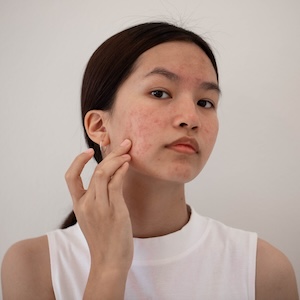Impact That Mental Health Can Have on Skin Conditions
- Posted on: Jan 31 2024

There’s no question that mental health issues – stress, anxiety, depression, and the like – can take a major toll on your physical health. With one of every five U.S. adults now living with some form of mental illness, this mind-body connection is more significant than ever.
Your skin is your body’s largest organ, so it makes sense that mental health can impact your skin health as well. Think about it: simply feeling embarrassed or self-conscious can make you blush – and frequent stress can do far worse.
“When I’m stressed out, I break out” is a concern that dermatologists hear often. Common skin conditions that worsen with stress include acne, rosacea, psoriasis, eczema, and many others.
The skin care experts at Forefront Dermatology, formerly Asarch Dermatology are here to help you understand how mental health concerns affect your skin and how we treat these problems when they arise. We’ll also share ways to manage stress that can keep you – and your skin – glowing.
How are mental health and skin health linked? It begins in the brain
The American Psychological Association confirms that many skin-related issues can be exacerbated by stress, and it begins in the brain.
Neurotransmitters are chemical messengers in your brain that facilitate communication between nerve cells. Stress, mood disorders, and other mental health issues often cause neurotransmitter imbalances, such as low levels of serotonin and dopamine (which both influence mood and well-being).
Your brain and body’s response to your mental state often manifest in your skin, causing flare-ups of existing skin conditions or creating new ones altogether. This connection is so strong that researchers created a new field of study – psychodermatology – to explore it further.
Hormones play a role in mental health and skin health, too
Hormones can heavily influence the health of your skin as well, leading to moisture loss, increased redness, excessive itchiness, decreased sebum production, and more. Like neurotransmitter imbalances, hormonal imbalances can aggravate existing skin conditions or cause new ones to develop.
Feeling tense? Your body releases a hormone called cortisol, which triggers a fight-or-flight response to stressful situations. Extra cortisol suppresses your immune system and worsens inflammation throughout your body, exacerbating skin issues like acne, rosacea, psoriasis, eczema, and even alopecia (hair loss). The fight-or-flight response then releases histamines, which can potentially cause hives.
Your brain also increases production of CRH (corticotropin-release hormone) in response to chronic stress. CRH binds to your oil glands, increasing oil production that can contribute to acne breakouts or worse.
A vicious cycle: how skin health concerns worsen mental health
Here’s where things get even more complicated – your skin is one of the first things that others see, causing many people with visible skin conditions or scars to experience low self-esteem. Their risk of anxiety or depression also increases.
Take eczema, which causes excessive itchiness, a visible rash, and more. These symptoms may result in higher stress and anxiety levels which, in turn, aggravates the person’s eczema – making their mental state even worse. Continued anxiety may trigger skin-picking, increasing their risk of scars.
Depressed people often do not get enough sleep, drink enough water, or follow a regular skin care routine, which all contribute to the health of their skin. It’s a cycle that can be difficult to break without help.
More dermatologists are embracing the connection between mental health and skin health, and Forefront Dermatology, formerly Asarch Dermatology is no exception. You can count on our board-certified dermatologists and staff to provide you with expert care and compassion every step of the way.
Ways to manage stress
Stress is a part of everyday life, and no one can avoid it entirely. However, you can learn how to manage it in more productive ways to keep it from spiraling out of control and impacting your health.
- Take time to relax – Take deep breaths, meditate, listen to calming music, or curl up with a favorite book. However you relax, use this time to distance yourself from negative thoughts.
- Get enough sleep – According to the National Sleep Foundation, adults need at least seven hours of sleep per night. Avoid using electronics for at least an hour before bedtime. Taking a warm bath or shower (and then moisturizing, of course!) can also help you get into sleep mode.
- Exercise – Exercise is one of the most effective ways to combat stress, anxiety, depression, and other negative emotions. Adults should get a minimum of 150 minutes of moderate-intensity exercise each week (that’s about 20 minutes a day).
- Eat a healthy diet – Avoid fried foods, processed meats, high-fat dairy products, and sugary snacks, which are all tied to anxiety and depression – and don’t do any favors for your skin either.
Start treating the impact of stress on your skin
In addition to thorough examinations and personalized treatment plans, Forefront Dermatology, formerly Asarch Dermatology offers professional skin care products to treat a variety of skin conditions. A regular skin care routine is also vital to keeping your skin as healthy (and stress-free) as possible.
To get started, schedule an appointment today at one of our three convenient locations in Englewood, Castle Rock, and Lakewood. During your consultation, a board-certified dermatologist will examine your skin and create a customized plan just for you.
